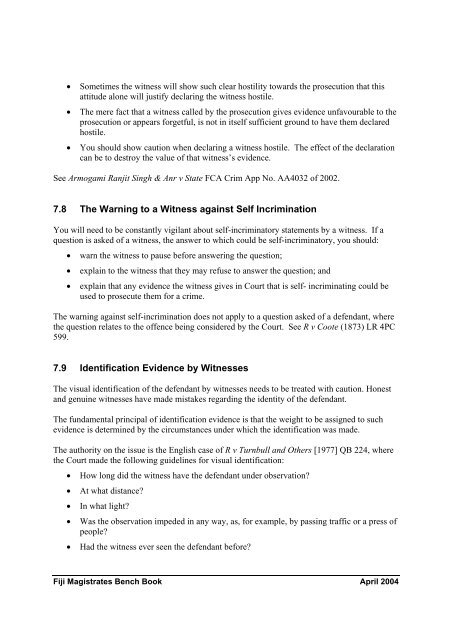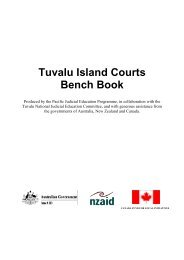Fiji Magistrates Bench Book - Federal Court of Australia
Fiji Magistrates Bench Book - Federal Court of Australia
Fiji Magistrates Bench Book - Federal Court of Australia
Create successful ePaper yourself
Turn your PDF publications into a flip-book with our unique Google optimized e-Paper software.
• Sometimes the witness will show such clear hostility towards the prosecution that this<br />
attitude alone will justify declaring the witness hostile.<br />
• The mere fact that a witness called by the prosecution gives evidence unfavourable to the<br />
prosecution or appears forgetful, is not in itself sufficient ground to have them declared<br />
hostile.<br />
• You should show caution when declaring a witness hostile. The effect <strong>of</strong> the declaration<br />
can be to destroy the value <strong>of</strong> that witness’s evidence.<br />
See Armogami Ranjit Singh & Anr v State FCA Crim App No. AA4032 <strong>of</strong> 2002.<br />
7.8 The Warning to a Witness against Self Incrimination<br />
You will need to be constantly vigilant about self-incriminatory statements by a witness. If a<br />
question is asked <strong>of</strong> a witness, the answer to which could be self-incriminatory, you should:<br />
• warn the witness to pause before answering the question;<br />
• explain to the witness that they may refuse to answer the question; and<br />
• explain that any evidence the witness gives in <strong>Court</strong> that is self- incriminating could be<br />
used to prosecute them for a crime.<br />
The warning against self-incrimination does not apply to a question asked <strong>of</strong> a defendant, where<br />
the question relates to the <strong>of</strong>fence being considered by the <strong>Court</strong>. See R v Coote (1873) LR 4PC<br />
599.<br />
7.9 Identification Evidence by Witnesses<br />
The visual identification <strong>of</strong> the defendant by witnesses needs to be treated with caution. Honest<br />
and genuine witnesses have made mistakes regarding the identity <strong>of</strong> the defendant.<br />
The fundamental principal <strong>of</strong> identification evidence is that the weight to be assigned to such<br />
evidence is determined by the circumstances under which the identification was made.<br />
The authority on the issue is the English case <strong>of</strong> R v Turnbull and Others [1977] QB 224, where<br />
the <strong>Court</strong> made the following guidelines for visual identification:<br />
• How long did the witness have the defendant under observation?<br />
• At what distance?<br />
• In what light?<br />
• Was the observation impeded in any way, as, for example, by passing traffic or a press <strong>of</strong><br />
people?<br />
• Had the witness ever seen the defendant before?<br />
<strong>Fiji</strong> <strong>Magistrates</strong> <strong>Bench</strong> <strong>Book</strong> April 2004
















